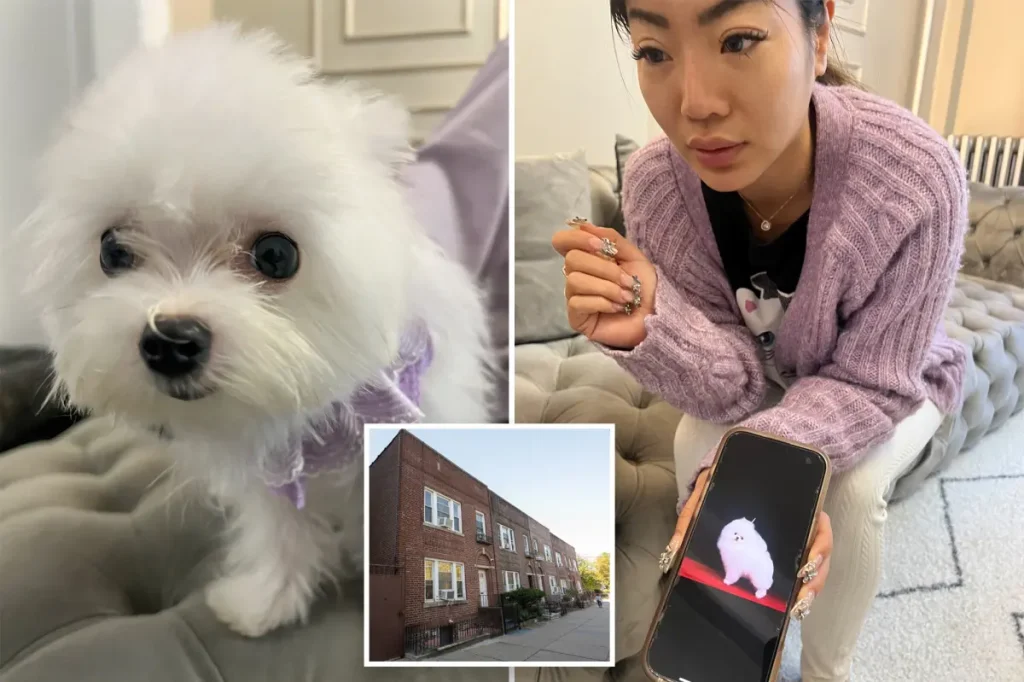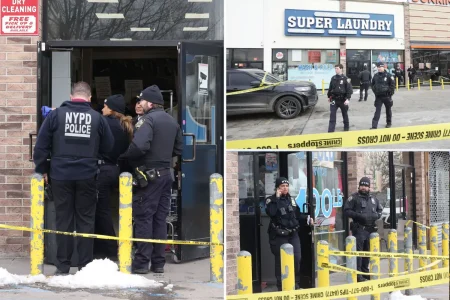The Underground World of Designer-Dog Sales in New York
In the quiet streets of Astoria, Queens, an unassuming residence has transformed into a covert luxury puppy emporium, brazenly defying New York’s “Puppy Mill Pipeline Act” which banned the sale of dogs, cats, and rabbits in pet shops since December. Behind the doors of what appears to be an ordinary home on the corner of 28th Street and 36th Avenue, a flourishing business called Tiny Cuties NYC operates, offering designer puppies for prices that would make even luxury car salespeople blush. An undercover investigation revealed a living room doubling as a showroom, complete with Louis Vuitton and Hermes purses displayed prominently on shelves, alongside photos of the owner Jenny Tsai posing with tiny canines. The business, easily discoverable through a simple Google search for “puppies for sale NYC,” presents itself as a high-end supplier of miniature designer breeds with price tags reaching an astounding $38,000 for a “micro teacup” white poodle named Miffy, projected to weigh merely 2.2 pounds when fully grown.
Inside this luxury puppy bazaar, the sounds of multiple dogs barking can be heard from the street, contradicting the polished image the business attempts to project. “We have 35 puppies here,” Tsai proudly stated during the investigation, adding that “another 30 in Taiwan” were ready to be shipped once they reached six months of age. She claimed her family operates a kennel in Taiwan and boasted about selling more than 600 dogs to date. Tsai emphasized that size determines the price – the smaller the dog, the higher the cost – explaining that these miniaturized breeds often come from mothers that can only produce one puppy at a time through C-sections, which supposedly increases their “value.” Most disturbing was her casual admission that patellar luxation (kneecap dislocation) affects about 90% of their teacup puppies, describing it as “normal” while advising that these fragile animals avoid sudden movements. “The kneecap is not too strong. It’s just too small to fit everything inside,” she remarked with concerning nonchalance.
The operation appears to target affluent clientele who view these tiny dogs as status symbols rather than living beings with health needs. “Our clients, they want a tiny dog… something they can put in a Birkin and travel around the world,” Tsai explained, revealing the troubling commodification of these animals. She proudly described her business as conducting its own “R&D” to create unique designer breeds that are “all tiny and cute.” This casual discussion of creating new dog varieties through experimental breeding practices alarmed Brian Shapiro, New York State director of the nonprofit Humane World for Animals, who described the operation as “a big money business with signs of puppy mill cruelty behind it.” Shapiro expressed shock at “such intense breeding that ends up in such a horrific physical place for an animal,” adding that “it’s almost like you’re mutating these animals into something so unnatural.”
When confronted, Tsai denied operating a puppy mill, insisting, “We’re not a pet shop. We breed our dogs ourselves, we breed them more than ten generations, and we know their lineage.” She claimed to possess a USDA license and regular veterinary oversight, while asserting her operation benefits society through “puppy yoga” and “puppy therapy” events. Dismissing concerns about the tiny dogs’ health issues, she described patellar luxation as “very common for any small breed dog” and claimed their average lifespan is 15 years – a dubious assertion given the documented health challenges facing extremely miniaturized breeds. Tiny Cuties NYC represents just one example of businesses apparently operating in legal gray areas, importing puppies through foreign pipelines and conducting significant portions of their business online in an attempt to circumvent the state’s ban.
New York’s Puppy Mill Pipeline Act was specifically designed to “cut off the pipeline” of animals being transported into the state from abusive puppy-mill breeding operations, according to state Senator Michael Gianaris, who co-sponsored the legislation. The law applies to both brick-and-mortar and online sales, defining a retail pet shop as “any for-profit place of business that sells or offers for sale animals.” Since its enactment, more than 60 pet shops across the state have closed, suggesting the law has been largely effective. “The amount of illegal puppy sales is down very dramatically, which means the law is working,” Gianaris noted, while acknowledging that “there’s going to be always some bad actors trying to find ways around it.” Another example emerged in Midtown Manhattan, where investigators discovered a pet shop apparently brokering the sale of Korean-bred designer dogs through an Instagram catalog, with prices reaching $4,000 per puppy.
The persistence of these underground operations demonstrates the significant money at stake in designer dog sales, driving some businesses to find creative ways to push boundaries and exploit loopholes. In July, the state attorney general’s office took action against Bayside’s Vanity Pups for attempting to sell a 10-week-old Cavapoo for $1,800 to an undercover investigator. The subsequent lawsuit filed by Attorney General Letitia James accused the business of “repeatedly and persistently” engaging in “fraudulent, deceptive, and illegal business practices” despite multiple directives to cease operations. As Brian Shapiro emphatically stated, “A sale is a sale,” highlighting the fundamental issue at the heart of these operations. Despite New York’s progressive legislation aimed at protecting animal welfare, the enormous profits available in the designer dog market continue to fuel underground businesses willing to risk legal consequences to access wealthy customers seeking living accessories rather than companions.












